The Polis Center has partnered with several organizations to develop knowledge platforms, portals, and websites to better inform constituencies. A sampling of our work is noted below.
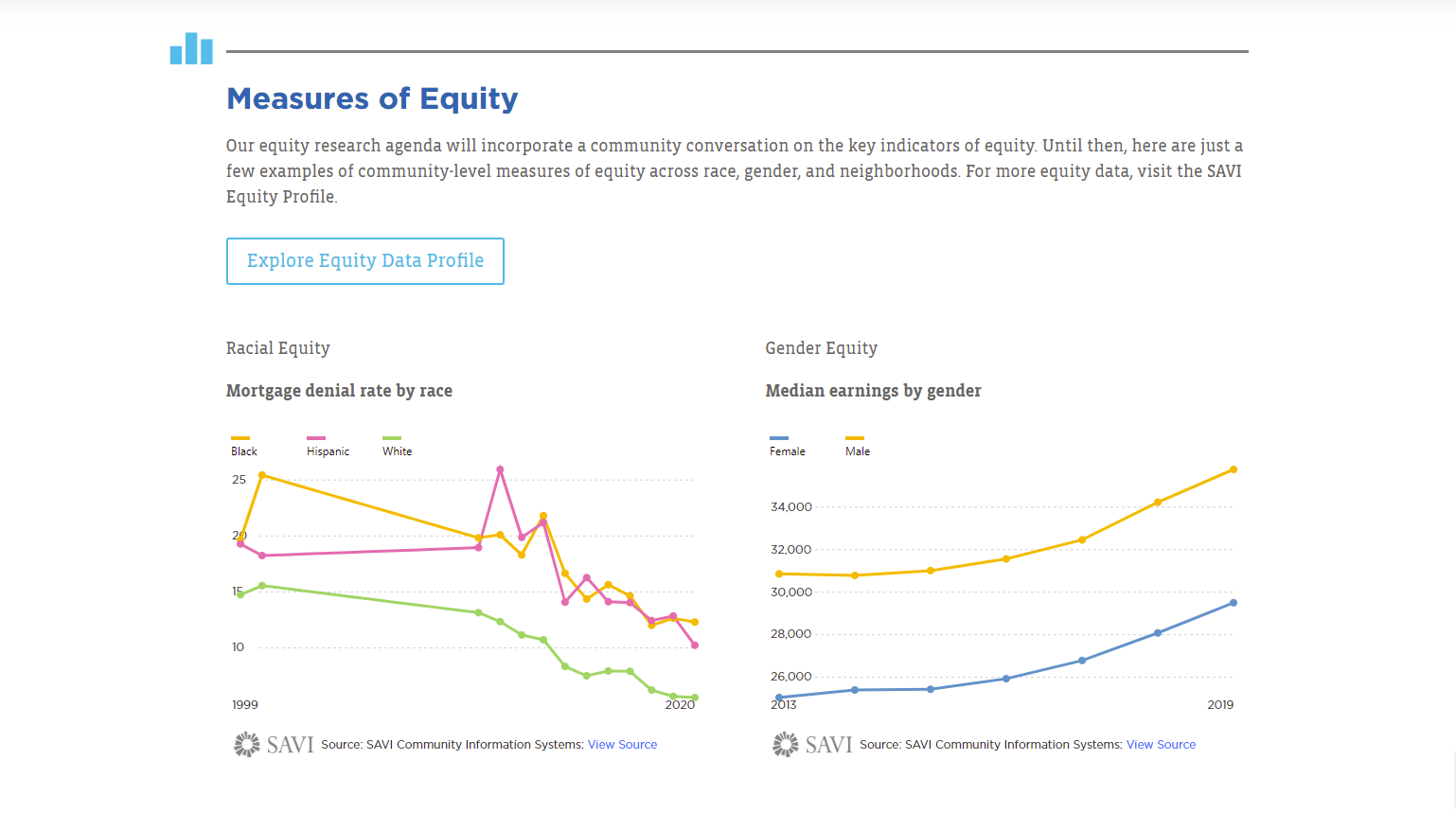
SAVI Equity Data & Information Hub
The SAVI Equity Data & Information Hub is a one-stop resource with links to information from recent and future SAVI Talks events and reports, an equity data profile for Central Indiana, and previous research on equity.

The State of Aging in Central Indiana Older Adults
A collaborative effort by Central Indiana Senior Fund, a fund of Central Indiana Community Foundation (CICF); The Polis Center at IUPUI; the IU Center for Aging Research (IUCAR); and the IU Public Policy Institute’s (PPI) Center for Research on Inclusion and Social Policy (CRISP), addresses concerns on aging in a new report, The State of Aging in Central Indiana, published April 15. In addition to this report, the joint endeavor produces issue briefs on emerging topics and this interactive information portal. We shared highlights from the report during the April 2021 SAVI Talks: Equity and Aging public forum. Learn more and read the report here.
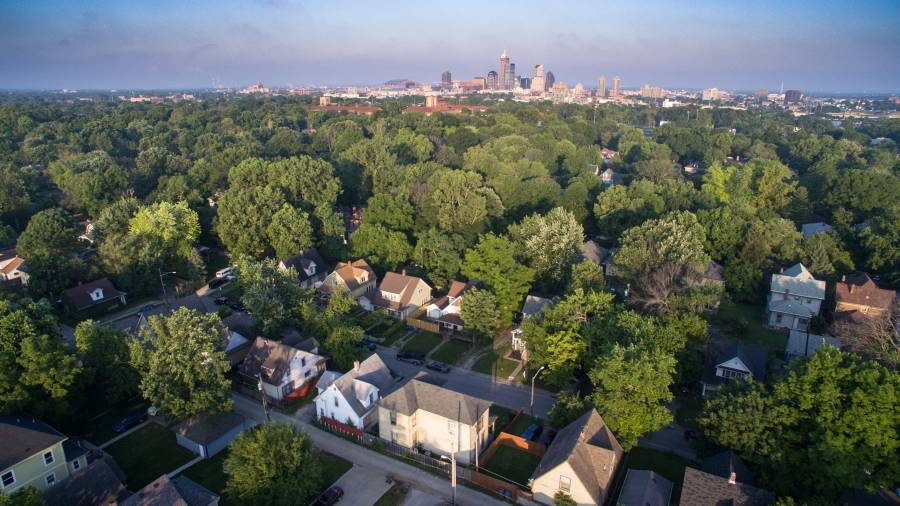
Diabetes Impact Project (DIP-IN)
The Fairbanks School of Public Health, in collaboration with Eli Lilly and Company, is working on a five-year neighborhood pilot program assessing high rates of diabetes and health disparities with the goal of preventing diabetes or better managing it so people can live long and healthy lives. The project is focusing on three Indianapolis neighborhoods (Northeast, Northwest, and Near West) where the prevalence rates are as high as 17.5% (average is 8.4%). This means about 10,000 people in these neighborhoods have diabetes. Polis developed The Diabetes Impact Project (DIP-IN) Community Profiles about these three focus neighborhoods. These community dashboards empower communities and community health workers to understand the context of their neighborhood.
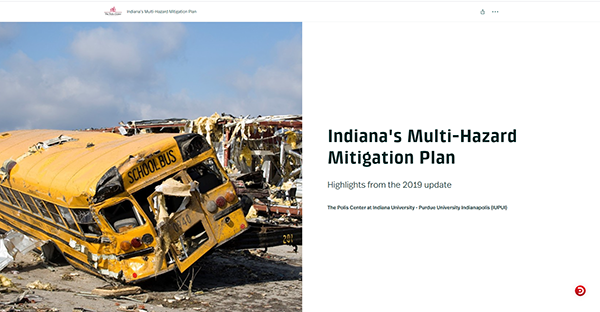
Indiana’s Multi-Hazard Mitigation Plan Highlights from the 2019 update Storymap
On behalf of the Indiana Department Homeland Security (IDHS) , the Polis Center has researched and prepared several county and state Multi-Hazard Mitigation Plans in Indiana (MHMP). Polis updated state of Indiana’s plan in 2019 and has worked on hundreds of county plans in the past decade. By fulfilling FEMA’s requirements, the plans have enabled the state of Indiana and counties to become eligible for a number of FEMA grants including the Hazard Mitigation Grant Program (HMGP), Flood Mitigation Assistance (FMA) grant program, Pre-Disaster Mitigation (PDM) grant program, the Building Resilient Infrastructure and Communities (BRIC) grant program, and other National Flood Insurance Program (NFIP) grants. The Indiana MHMP lays the framework for accomplishing one of the IDHS’ top 2019-2020 strategic priorities of expanding mitigation and resiliency in the State of Indiana. This includes expanding statewide collaboration and planning, promoting safety, implementing a statewide mitigation strategy, and strengthening partnerships that impact resiliency. The full plan is available here.
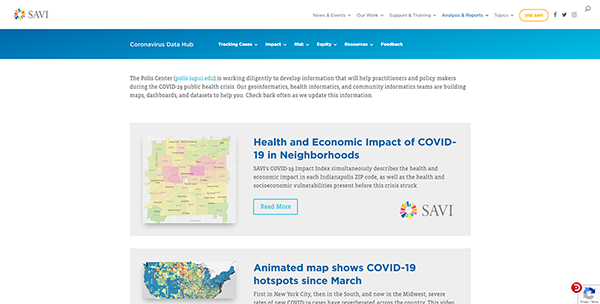
SAVI COVID-19 Data & Information Hub
The Polis Center launched the SAVI Coronavirus Data Hub in March 2020 to provide practitioners and policymakers access to new data and actionable information during the COVID-19 public health crisis. This platform includes maps, data, dashboards, and articles highlighting disparities and inequities for hard-hit neighborhoods, at risk neighborhoods, and highly impacted populations such as older adults and people of color. The Polis Center and SAVI were nominated for the Community Impact category for the 2021 TechPoint Mira Awards honoring “The Best of
Tech in Indiana.”
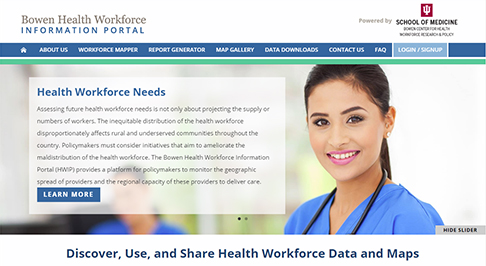
The Bowen Health Workforce Information Portal
The Polis Center collaborated with the Bowen Center for Health Workforce Research & Policy to create the Bowen Health Workforce Information Portal (HWIP). The portal was developed to allow stakeholders the ability to readily discover, use, and share health workforce information. Additionally, HWIP provides reliable and timely data on Indiana’s health workforce in order to support data-driven policy development and to inform decisions at both the state and local levels. The HWIP is maintained by the Bowen Center for Health Workforce Research & Policy at the Indiana University School of Medicine in collaboration with the State of Indiana.
Between May and July of 2016, the Bowen Center conducted an assessment of stakeholders’ data access and health workforce mapping needs. Based on needs identified by stakeholders, a data portal from which customized health workforce information would be accessed was prioritized. Technical and functional requirements for the Bowen Health Workforce Information Portal were established with the assistance of an advisory committee composed of executive decision makers from key state agencies, who provided ongoing input on technical and functional requirements, wireframes, and graphic design specifications. Three major functions were defined during this process: an Interactive Workforce Mapper, a Map Gallery, and a Data Download application. These functional components provide a solid foundation from which future expansion may occur in order to provide Indiana with timely and relevant health workforce data to inform health workforce policy and planning.
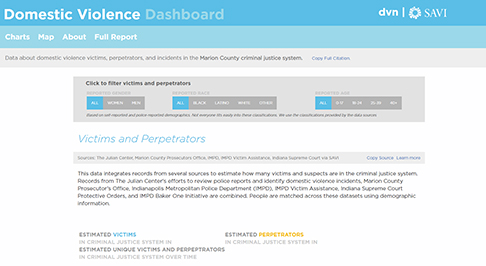
Domestic Violence Dashboard
The Polis Center collaborated with the Domestic Violence Network to develop the online Domestic Violence Dashboard, which presents data about domestic violence victims, perpetrators, and incidents in the Marion County criminal justice system. The dashboard features simple interactive charts, maps, and citations to make the data easy to use for advocates, media, and policymakers. Polis data from The Julian Center, Indianapolis Metropolitan Police Department (IMPD), IMPD Victim Assistance, Indiana Supreme Court Protective Orders, Marion County Prosecutor’s Office, Baker One Initiative, and 2-1-1 Connect2Help. A more detailed report on trends also is available on the website.
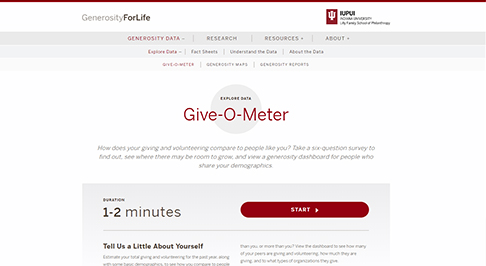
Generosity for Life
The Polis Center partners with the Indiana University Lilly Family School of Philanthropy to develop Generosity For Life, an interactive platform and resource on charitable giving that offers a multifaceted look at American families’ generosity over time. The Polis Center developed tools to visualize and analyze data from the school’s Philanthropy Panel Study (PPS), which tracks over 9,000 individuals’ and families’ giving, volunteering, and factors that influence those practices (e.g., employment, health, marital status) throughout their lives. PPS is the leading and most accurate resource for measuring generational giving and volunteering in the United States. Generosity for Life serves to understand how Americans are giving, encourage additional giving, and help to educate the public about generosity.
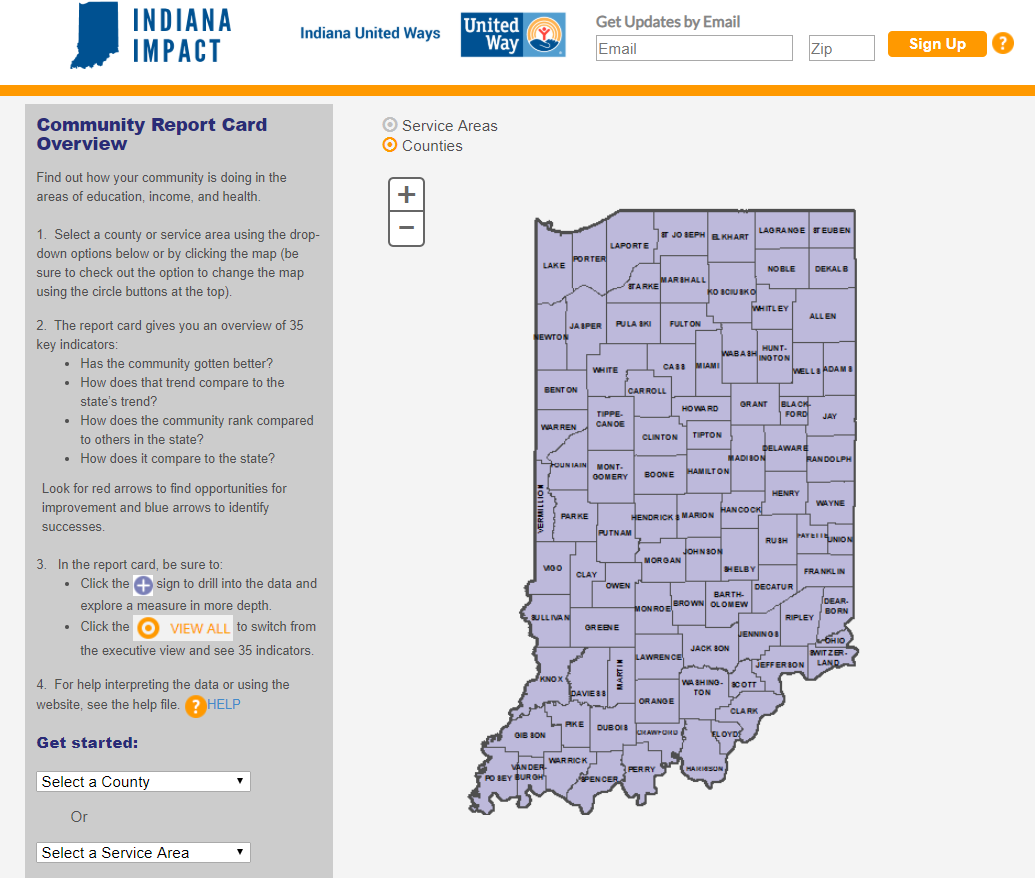
Indiana Impact
Indiana Impact community report card (www.indianaimpact.org) provides a quick snapshot of trends related to education, financial stability, and health for each county and United Way service areas across the state. Polis created the tool in partnership with the Indiana Association of United Ways to make data about key community trends easily available to United Ways around the state and to the nonprofits they serve. Indiana Impact was given an award for excellence in GIS in Indiana.
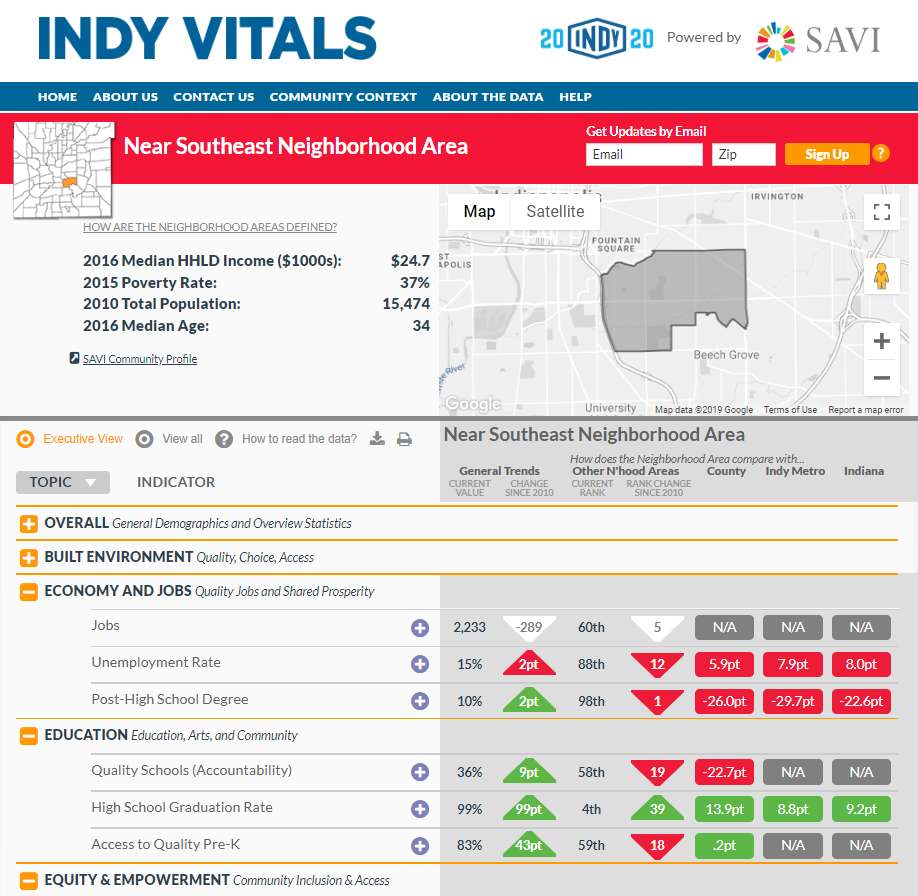
IndyVitals
Winner of state and national awards of excellence, IndyVitals serve the data needs of communities in Marion County. The Polis Center partnered with the City of Indianapolis and the Greater Indianapolis Progress Committee to create IndyVitals.org, an online dashboard to support the City’s bicentennial efforts of Plan 2020. IndyVitals measures the health and stability of neighborhood areas in Marion County in categories such as Built Environment, Education, Economy & Jobs, Equity & Empowerment, and Health & Safety. The purpose of IndyVitals is to measure the overall impact of a wide array of Plan 2020 initiatives on neighborhoods and improve data access for community-based organizations, nonprofits, planners, and neighborhood representatives working on community improvement initiatives. This effort was funded through a grant from the US Department of Housing and Urban Development.
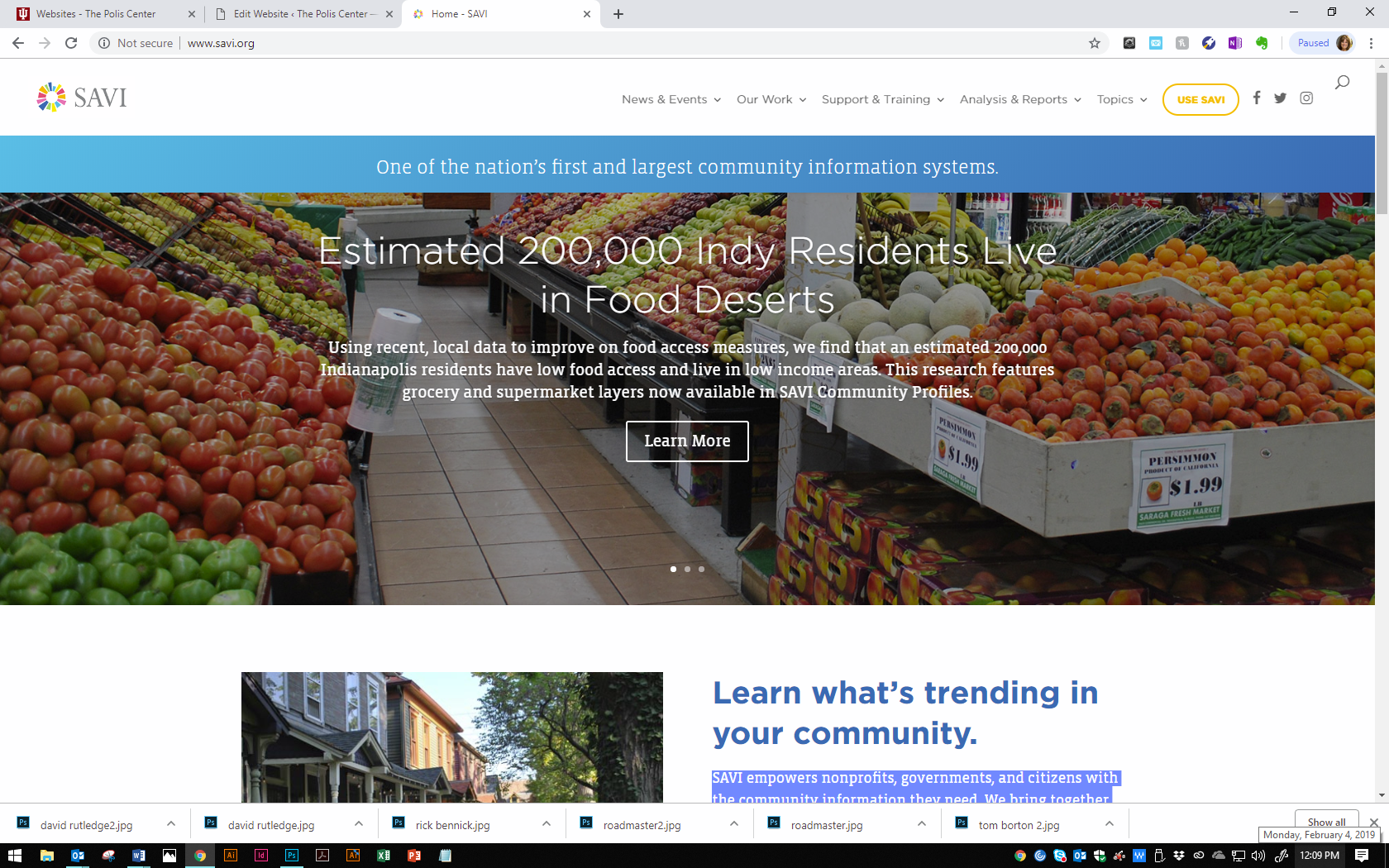
SAVI.org
SAVI empowers nonprofits, governments, and citizens with the community information they need. We bring together many data sources to power our SAVI tools and our research. Communities use this information to plan, to secure and target resources, and to advocate.

